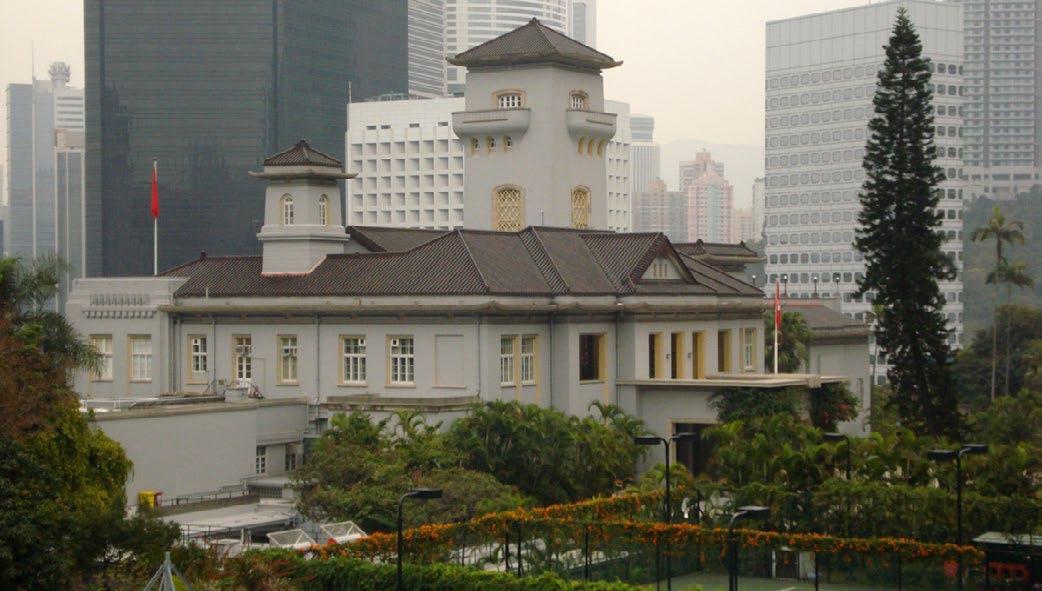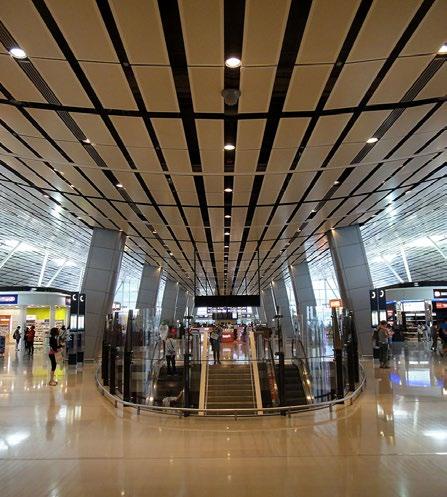
6 minute read
Economic recovery or recession in 2021 hinges on border
More stimulus may be needed to keep businesses afloat as the challenging economic environment continues
Economic recovery or recession in 2021 hinges on border reopening
Budget deficit makes up 11% of GDP, but more stimulus is still needed to keep businesses afloat.
Hong Kong will continue to face challenges in 2021, with analysts’ economic expectations split between a possible recovery and a continuing recession, ultimately depending on how the COVID-19 situation develops as well as government response.
The city’s gross domestic product (GDP) could rebound as much as 4% in 2021, according to DBS economist Samuel Tse, provided the border reopens in Q1 as expected. Alicia Garcia-Herrero, chief economist for APAC at multinational financial services firm Natixis, forecasted the same growth but also noted that GDP could fall by as much as 6%.
Hong Kong’s mixed outlook is reflected in Financial Secretary Paul Chan’s statement on 3 January, where he echoed expectations for Hong Kong to face major challenges in the first half of the year whilst strong recovery momentum is expected in the second half of 2021.
“We all hope that the economy can recover from the epidemic this year, but the reality is that there are still many risks hidden and we must remain vigilant,” Chan wrote in his official blog post where he also noted that uncertainties, such as the Sino-US relations and the geopolitical situation, would remain.
Chan also warned of financial risks that may arise, noting that many governments have significantly increased their expenditures in response to the pandemic, which has caused many economies to build high debts.
A study by professional accounting body CPA Australia gave a more pessimistic view. Its recent Hong Kong economic sentiment survey found that 75% of its respondents, or about three in four of accounting professionals, expect Hong Kong’s recession to continue until 2021.
In November 2020, professionals told CPA Australia that the global availability of a vaccine is the key to whether Hong Kong’s economy will recover or recede in 2021.
“Global capital markets have reacted positively to news about the development of COVID-19 vaccines. This suggests that investors are increasingly confident that there could be a global economic recovery once a vaccine becomes available,” CPA Australia noted.
However, the bleak outlook amongst accountants indicates that the positive global sentiment has yet to reach the real economy and there is some way to go before business confidence turns positive, the accounting firm added.
Much of the economic recovery also depends on the recovery and growth of the global economy and Mainland China’s economy. The good news is that Mainland China has mostly reopened, and the world’s second largest economy is set to expand by 2.3% in the whole of 2020, says Fitch. It is the only major economy of the world to record
Financial risks may arise as governments increase their expenditures in response to the pandemic
a growth for the year. It is further expected to expand by 8% in 2021, according to Fitch, and even up to 9%, says Nomura.
However, should global economic growth remain weak, it will likely affect Hong Kong adversely. Challenges may also arise from developments in the local political environment. DBS economist Tse has also observed this, stating that the rebound of asset prices and the economy will hinge crucially on the development of COVID and the relaxation of immigration policies.
More stimulus necessary
Tse highlighted the ballooning unemployment in the city, noting in a report that should the COVID situation turn south and travel activities remain halted, the jobless rate will soar in the months ahead.
Hong Kong’s unemployment soared to its highest in 16 years, July-September at 6.4%, with more than 15,600 workers having lost their jobs during this period alone. Furthermore, Secretary for Labour and Welfare Dr. Law Chi-kwong echoed gloomy prospects for the local job market, saying that it will likely remain under pressure in the near term with the overall economic situation remaining weak and the global pandemic still evolving.
Whilst news about COVID-19 vaccines in the tail-end of 2020 have revived consumer and investor sentiments, the possibility of reopening of Hong Kong’s borders sooner rather than later had a reality check when a surge in COVID-19 cases in late November and early December scrapped plans for a Hong Kong-Singapore travel bubble.
This, coupled with retail sales unlikely to see relief in the near term, makes it necessary for the government to introduce a new wave of stimulus packages in order to avoid the next wave of business closures, according to Tse.
CPA Australia’s report also noted that many accounting professionals are bracing for lower revenue and a muted job market, signalling expectations that the business environment will remain in doldrums throughout the year. Almost half or 46% of respondents expect their company’s revenue to decrease, whilst 45% forecast a hiring freeze in 2021. 58%, also named cost reduction as their key strategic focus for the year.
Based on survey responses, CPA spokespersons Anthony Lau, Janssen Chan, Eden Wong, and Roy Lo recommended that the government extend and optimize the Employee Support Scheme to provide further time-limited financial support to employers to retain employees. They also suggested the introduction of a tax loss carry back for small and medium enterprises (SMEs) or businesses in the hard-hit sectors for the next two years.
Other suggestions include further enhancing Hong Kong’s position as a family office hub by implementing further measures and issuing more long-term bonds or perpetual bonds in international bond markets.
However, it may be hard for Hong Kong’s government to hand out more stimulus due to laws limiting further stimulus will require the government to issue government bonds, Tse said, as it challenges the mandate of “keeping the expenditure within the limits of revenues in drawing up its budget” stated in the Basic Law, the city’s mini-constitution.
Setting political obstacles aside, enlarging the scale of debt issuance will fuel the nominal interest rate, Tse noted. Coupled with the deteriorating credit rating of the city, this may lead to some upward pressure on government bond yield.
Another pressing matter in the long term is Hong Kong’s workforce problem. Natixis’ Garcia-Herrero noted that whilst economic activity will likely rebound in 2021 thanks to more activity coming from Mainland China and the rest of the world, the following year of 2022 will show a downward trend as the city ages and loses its talents.
Data from the Census & Statistic Department (C&SD) shows that growing ageing population and a subsequent shrinkage in its workforce headcount. In the latest labour market report released in September 2020, C&SD posits that the workforce will reach more than 3.64 million in 2024, then begin to steadily decline in the years to come—dropping to only 3.55 million by 2034, and to 3.2 million by 2054.
The impact of the COVID-19 pandemic has led to the labour force to drop to 3.54 million in the first half of 2020, and the pandemic’s impact on the labour force market in the near term remains uncertain. The structural decline of the labour force resulting from the aging population will also increase the need of issuing sovereign bonds over the longer term, Tse said.

Recovery leaders, laggards
The finance sector is expected to be the biggest contributor to Hong Kong’s economic growth in 2020, according to Natixis’ Garcia-Herrero.
“The financial sector in Hong Kong is a rare sector with limited drag from the COVID-19 and will continue to be a key source of economic growth in 2021. Abundant and cheap liquidity in the USD and the HKD will drive demand for loans and bond financing,” she said. The presence of more Chinese firm listings will also mean more activities for equities, she added. Furthermore, the opening of Wealth Management Connect in the Greater Bay Area and the enhancement of REITs could also bring new opportunities.
Garcia-Herrero added that if the pandemic is brought under control, a cyclical rebound will definitely be a positive for the overall economic growth. However, the cross-border people movement may still be challenging given, dragging the speed of recovery.
The rebound of the economy will hinge on COVID and the relaxation of immigration policies
The reopening of borders will help drive economic growth in 2021



